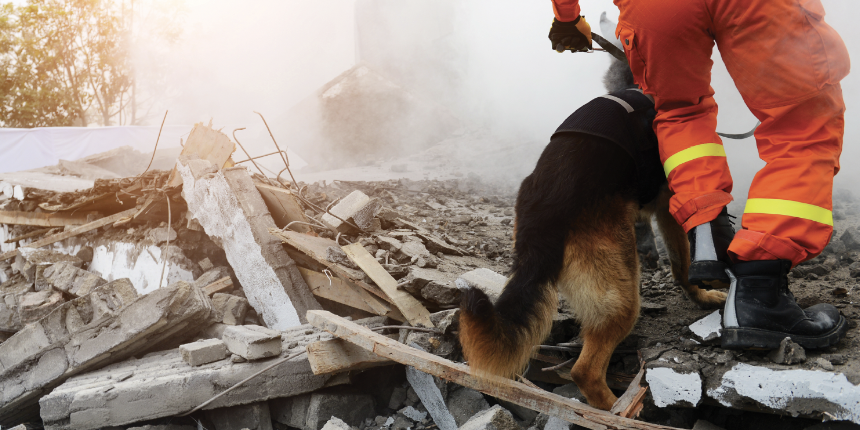How Freight Brokers Aid in Disaster Recovery
Cori Eckley-Ritchards of NATCO discusses the diverse nature of relief efforts and the advantages brokers offer when disaster strikes

When natural disasters like the devastating Hurricane Milton strike, freight brokers work tirelessly behind the scenes to ensure that relief reaches those in need, making brokers one of many unsung heroes in the process.
Based in Arlington, Texas, North American Transport Concepts Inc. (NATCO) experienced firsthand how the brokerage industry plays a crucial role in hurricane recovery and natural disaster relief efforts.
Cori Eckley-Ritchards, vice president at NATCO, and her team worked around the clock after Hurricane Milton to provide resources and coordinate logistics to support their clients.
Because of the extreme variability of natural disasters, brokers such as NATCO have an advantage in their ability to pull from different pools of resources depending on their clients’ needs. This resiliency allows brokers to provide tailored solutions that account for each client’s unique risks, whether from hurricanes, earthquakes, wildfires or floods.
“It’s our ability to adapt that makes us valuable, especially when the situation on the ground is constantly evolving,” Eckley-Ritchards explains.
Each disaster presents a unique set of challenges, including delivering essential supplies like food and water or transporting building materials to support long-term recovery.
“Transportation plays a huge role in disaster recovery,” Eckley-Ritchards says. “The demand for resources varies dramatically, and we’re often under severe time constraints to meet the needs of people, businesses and emergency responders.”
Flexibility and Communication Are Crucial in Disaster Recovery
Flexibility is an invaluable asset during disaster recovery. Since brokers are inherently flexible, the first action they should take when natural disasters hit is to stand by and be ready to respond.
During the relief efforts after Hurricane Milton, Eckley-Ritchards and her team at NATCO worked over 15 hours a day for more than two weeks, just a small testament to their commitment to supporting their clients. Disaster recovery is challenging, and being accessible 24/7 is critical to helping clients, especially when dealing with unforeseen circumstances.
“It’s not uncommon for clients to reach out late at night or early in the morning with updates or urgent requests,” she says. “We have to be ready to adjust our plans on the fly.”
Brokers must be able to adapt to every scenario in the face of natural disasters, but just being flexible is not enough-constant communication is also a necessity. Communication between clients, staff, emergency responders and relief organizations is pivotal for brokers.
“A lot of it comes down to the upfront communication,” Eckley-Ritchards says. “Knowing the role of each party involved and understanding the resources we need to deploy are crucial. We do a lot of strategizing to prepare, but sometimes the actual needs are far different from what we anticipated.”
For example, working with the American Logistics Aid Network (ALAN), an organization dedicated to providing supply chain assistance following natural disasters, requires active communication between the organization and brokers in place. ALAN, which was especially prominent during Hurricane Katrina in 2005, continues to help more than 100 humanitarian organizations provide disaster relief.
“We need to show that we have boots on the ground, that we’re actively involved in the recovery and that the supplies are accessible,” Eckley-Ritchards says.
By continuing to raise awareness of brokers’ ability to aid in disaster recovery, the industry becomes stronger. The demands of each disaster are unique, and the variety of resources brokers can deploy are pivotal for recovery efforts. Beyond immediate relief, brokers also play an essential role in rebuilding the local economy and infrastructure.
“We’re involved in various projects that range from immediate supplies like water and food to long-term recovery efforts, such as delivering building materials and helping with infrastructure rebuilding,” Eckley-Ritchards explains.
She emphasizes that brokers’ ability to mobilize crucial resources, such as lumber or shingles, across various regions is vital to rebuilding.
“The location doesn’t matter as much as the ability to get what’s needed where it’s needed,” Eckley-Ritchards says. “Whether it’s in North Carolina after a hurricane or anywhere else, brokers like us can pull the right resources from across the nation to support these recovery efforts.”
“Transportation plays a vital role in all facets of disaster recovery. Whether delivering immediate relief or supporting long-term rebuilding efforts, brokers are at the heart of getting communities back on their feet.”
Innovations Shaping the Future of Disaster Recovery
Looking ahead, Eckley-Ritchards sees advancements in weather forecasting and technology playing a significant role in disaster recovery. Companies like StormGeo and organizations such as the National Oceanic and Atmospheric Administration’s National Hurricane Center are continuously improving their ability to predict storms. As forecasts become more accessible and accurate, brokers can better plan where resources will be necessary, helping them provide even more effective assistance. Additionally, better access to real-time data and communication tools can help brokers coordinate their efforts more efficiently.
As natural disasters have the potential to become more frequent, the demand for skilled freight brokers will only increase. Brokers’ ability to mobilize resources quickly, adapt to shifting demands and coordinate across multiple sectors makes them indispensable in times of crisis.
“Transportation plays a vital role in all facets of disaster recovery,” Eckley-Ritchards says. “Whether delivering immediate relief or supporting long-term rebuilding efforts, brokers are at the heart of getting communities back on their feet.”
Her commitment to helping her clients is evident, especially in the face of natural disasters.
“Every day is different, and that’s what I love about it,” she says. “I thrive in situations where I can make a real difference, whether that’s in responding to a disaster or helping a community rebuild.”
Brokers like NATCO are critical in providing support when it matters the most. As the availability of resources and technology for freight brokers increases, their roles in recovery efforts are more vital than ever. It is up to the individuals in the brokerage industry to take responsibility and equip themselves with the knowledge, skills and abilities needed to aid in disaster recovery.
Have you been involved in humanitarian and natural disaster assistance? Let us know byemailing your story to marketing@tianet.org.
Jennifer Zhao is the digital marketing specialist at TIA. You can reach her at zhao@tianet.org.

